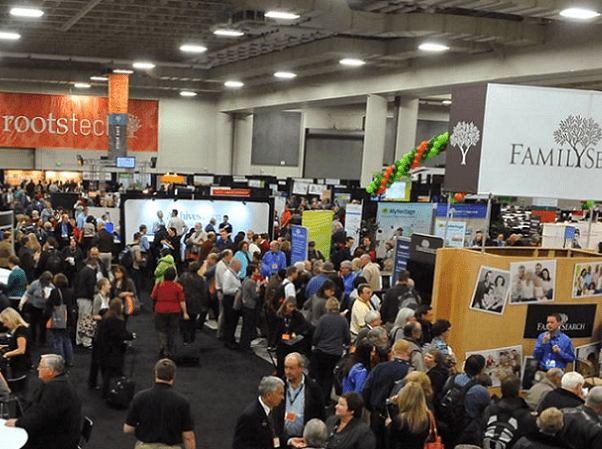Introduction: In this article, Gena Philibert-Ortega writes about a major attraction for people attending RootsTech 2019 in Salt Lake City, Utah: the Family History Library. Gena is a genealogist and author of the book “From the Family Kitchen.”
Going to RootsTech 2019? Lucky you! One of the benefits of attending RootsTech is that you will be across the street from the largest genealogy library in the United States: the Family History Library in Salt Lake City, Utah. That benefit is one that thousands of your fellow genealogists are hoping to also take advantage of during the week of RootsTech (Feb. 27-March 2). Because the Family History Library will be buzzing with researchers, you need to strategize your visit so that you can make the most of your time there. Here are a few ideas.

Know Before You Go
Just showing up at a research library without pre-planning is never a good idea. Take some time before you leave for Salt Lake City to search the FamilySearch Catalog. Conduct exhaustive searches for the place you are researching. If you are researching a city in the United States, conduct a Place search for the city, then a Place search for the county (or parish) and finally a Place search for the state. Browse the items available and note what would be of use to your research. Also note which resources can only be accessed at the Family History Library (such as books, maps, periodicals, CDs and microforms). Prioritize so that items that can be searched online (digitized collection) are done while you are at home.
In addition to perusing the Catalog, before leaving for the Library take some time to search the FamilySearch Research Wiki. “You may find that there is a link to an outside organization that either has the records or an index to the records that you are looking for online,” says professional genealogist Luana Darby, AG.
Remember that the Wiki has numerous articles as well as web pages dedicated to the state or country you are researching, and identifies the records that can be found both through FamilySearch and in other locations. Luana also points out that “There are many more things the Wiki can do for you before going to the Library – it can help you understand jurisdictions, the scope of records, and even the hours of the Library.”
Take some time to search the Wiki for the place your ancestor lived or the record type you are interested in.
Speaking of the Wiki, check out the pages pertaining to the Family History Library to plan your time there. On the Family History Library Wiki page, scroll down to the “Prepare for Your Visit” section for links to Wiki pages with information about each floor and what can be found there. This will help you orient yourself to the Library. The link for Library Orientation includes an interactive map of the Library that can be helpful.
One last suggestion. It’s easy to think that you are at the Family History Library to look at books and microforms and not much else – but do yourself a favor and don’t forget the Family History Library Portal, available on computers at the Library, that has subscription websites available. Not all of these websites are available through the Family History Center Portal (available at your local Family History Center), so it is worth your time to devote some of your research efforts to conducting searches on these websites at the Family History Library. You can see the list of websites on the Wiki page, Subscription Websites Available at the Family History Library. Don’t forget your flash drive so that you can download what you find, whether that be periodical articles or records.
Stay Focused and Have a Backup Plan
It’s easy to walk into the Family History Library, especially the first time, and totally forget all of your research plans. There’s a lot to do at the Library aside from research, including recording oral histories and attending presentations. So, before you leave home, choose some goals and write out a research plan. Decide what family history questions you want answered. What records will help answer those questions? Start a research log in a spreadsheet, a form, or a word processing document and list all of the records you want to search, what you hope to find, and add columns for your results and source citations. Organizing yourself ahead of time will help you stay focused when you become overwhelmed or lose focus after a long day.
Ask
There’s help at the Library if you need it, so don’t feel like you have to figure it all out on your own. Missionaries from the Church of Jesus Christ of Latter-day Saints are available on each floor to help you navigate resources. Missionaries? Don’t worry, they aren’t there to proselytize, they are there to help with family history questions. Each floor also has staff Research Specialists that can help with your research questions. Learn more at the Wiki page, Guest Resources at the Family History Library .
Have a great time at RootsTech and remember to spend even a short amount of time at the Family History Library!
GenealogyBank at RootsTech
Come visit the GenealogyBank team at Booth #1025. Our trained staff would love to meet you, and are prepared to help with your family history questions.
Also, Scott Spencer, GenealogyBank Vice President of Customer Experience, will be making a presentation entitled “What Next? Telling the Story with Newspapers and Obituaries.”
Session description:
Newspapers are one of the most underutilized resources in family history research and yet they can be one of the most valuable. Attendees will learn more about how newspapers can take them far beyond the names and dates of their ancestors by enriching their research with unique stories and details that can only be found in newspapers.
Whether the challenge is overcoming a brick wall or learning more about the life of an ancestor, this class will teach you practical tips on how to get the most out of newspapers and obituaries. Participants will learn about the more than 9,000 online newspaper titles, published from 1690-today, in GenealogyBank’s Historical Newspaper Archives, while walking away with knowledge and resources that will allow them to immediately begin making discoveries of their own.
